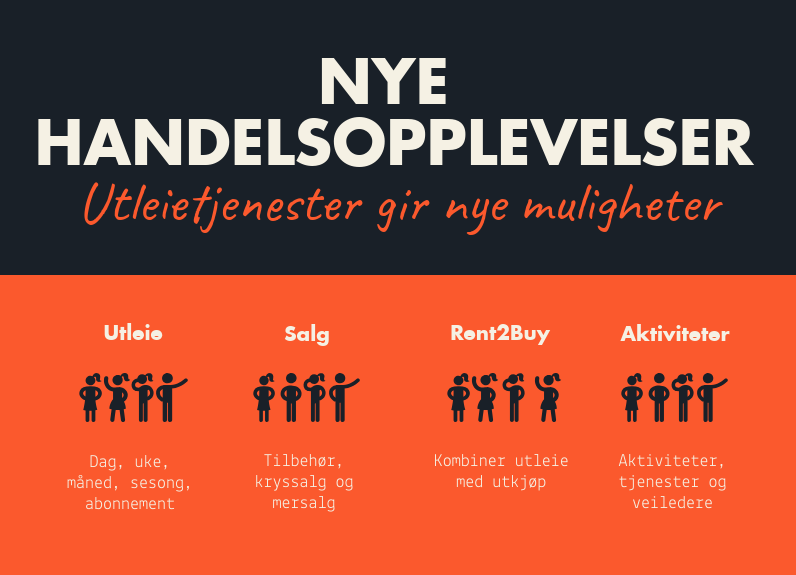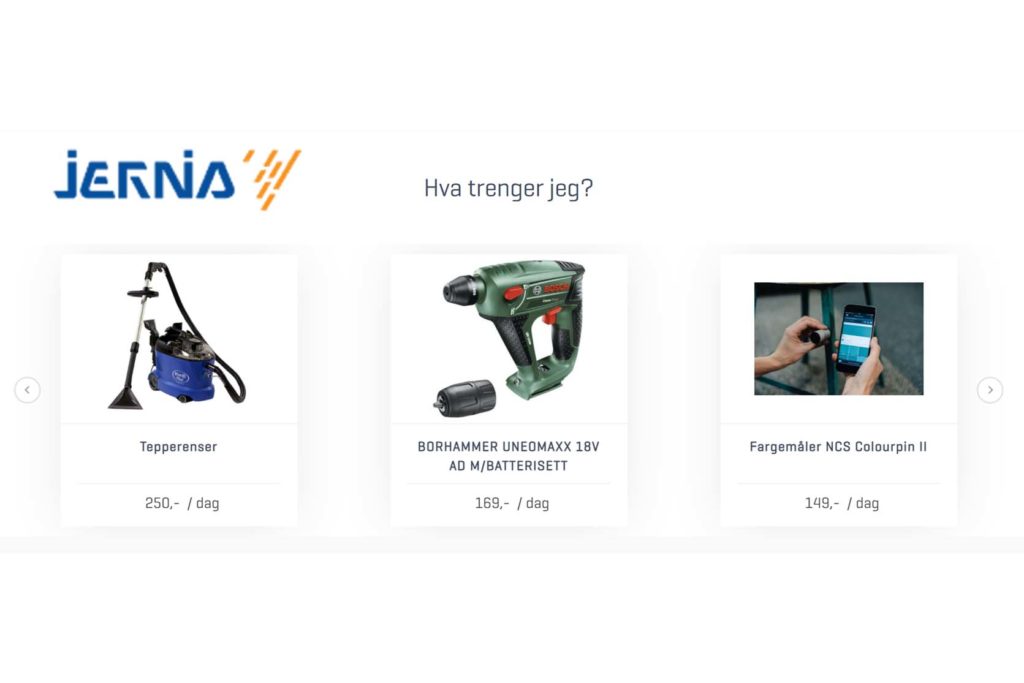


Rental is a service that caters to the customers real needs by offering products that solve a customer activity or project.
Several big businesses such as DNB, e24, Danske Bank, Virke and Dagens næringsliv have increasingly discussed how e-commerce is taking increasing shares of the trade at the expense of the physical store and predicts increased store death . Even cheap chains like Clas Ohlson report that they are closing physical stores in Germany and the UK, at the same time as they will start selling items on Amazon in the UK .
At the same time, new service models are being developed, which, with the help of technology, focus on increasing the utilization of resources in society. This also creates opportunities for the retail industry. Rental models can get more people into the stores, diversify income, reduce consumption, and most importantly improve the service level in the shops.
The global trends are clear. Online shopping now has 5% of the entire market in the United States. Retail growth in physical shops has declined and is the drop is bigger now than during the financial crisis in 2008. By contrast, tech giants like Amazon are growing and now account for half of all online sales. This means that a single company accounts for 2.5% of all retail trade in the United States (DNB News)!
The market for e-commerce in Norway is also growing. In 2017, 75 per cent of Norwegians have shopped online and e-commerce is growing three times faster than the trade otherwise according to Virke. Technology companies such as AirBnb and Uber are also leading the way with new sharing models and services. Other examples, include the CEO of Chinese AliBaba, Jack Ma, one of the world’s largest e-commerce companies, invested in Rent-the-runway, a clothing rental company, which valued the company at $800 million in the United States .
These are global trends that are also hitting Norway. AirBnb reports a doubling from last year and now expects revenues of 2.4 billion in 2018 in Norway. Fjong who rents out clothes reports that the number of users has grown to 20 000 and Nabobil has passed 100 000 rents online. The automotive industry is also following closely. Volvo Care is a new subscription service that introduces cars to customers without the usual maintenance that usually comes with it. Banks also cooperate with car dealers and distributors in a new car service called shft.no – with Norwegians waiting in line to test it out.
In a blog post for DNB, the director of Virke Handel, Harald Andersen, says that with digitization, competitors from Sweden, the US or China are just a click away. Therefore, those who have a physical store will have to invest more in the actual customer experience. In addition, the physical stores must have digital meeting places where they can attract their customers, says Andersen.
In order to maintain the physical stores, you have to innovate. You have to meet customers with digital technology, apply principles from e-commerce, and adopt new models and services that meet customers real needs in a completely different way.
One of the areas with opportunities for retail is rental-based business models. Rental is a service supplement that goes straight to the customer’s real needs, namely an activity or project to be performed. It typically requires quality products in a higher price range, but can provide both a supplementary cash flow, and be positive for the brand by communicating the environmental gains to the market.
Customers with short-term needs then has the opportunity to rent the product, instead of buying it. You may then be able to compete for customers who would normally be happy to buy lower quality products. This gives you the opportunity to get new customer groups into the store, while also allowing for additional sales of accessories. In many cases, stores also have trouble getting returned or unsold goods back into circulation where rental can provide a solution.
Some customers that do not know even what product they need or what price range they should target, can rent products and then get the advantage of buying the right product later. This is a model we have termed Rent2Buy which ensures the customer needs in a whole new way.
Customers who initially have a purchase requirement for a product over a long period of time should still be given the opportunity to rent, from season rental to subscription services. Urbanisation also means that we have fewer square meters to live on, as storage space can also be a challenge that can provide a new service dimension for the customer.
There are technology platforms that can enables retail to test out rental services without any big investments. Sharefox is an example of a digital platform for businesses that want to create new rental-based services, combine sales and rentals, take part in circular economy or digitize rental for efficient operation. The customer journey must combine digital presentation, but can be complemented with physical store experiences when the customer picks up or returns.
By adopting the principles of e-commerce and combining it with the new services such as rental-based models, you can attract new customer groups and at the same time do good for the planet.
